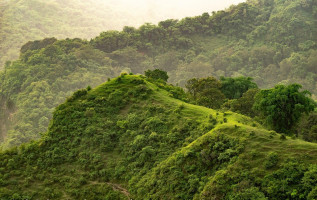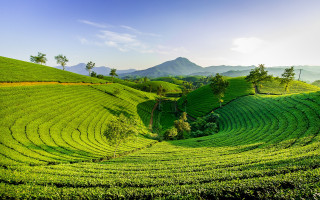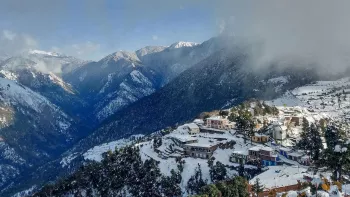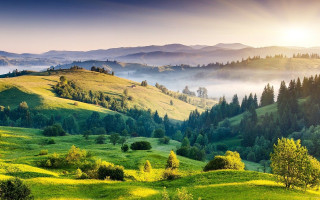Mukteshwar Temple
Pathankot . Auroville . Tamil Nadu . India
Duration
1 to 2 Days
1 to 2 Days
Best time to visit
Mar-Jun, Sep-Nov
Mar-Jun, Sep-Nov
Theme
Religious, Hill Station
Religious, Hill Station
Mukteshwar Temple Travel Guide
Mukteshwar Temple is a famous religious site located in the charming town of Mukteshwar in Uttarakhand, India. Situated at an altitude of 7500 feet, this ancient temple holds great historical and cultural significance. Dedicated to Lord Shiva, the temple is believed to be over 350 years old and features intricate stone carvings and stunning architecture. Mukteshwar Temple is renowned for its spiritual aura and breathtaking views of the snow-capped Himalayan peaks.Top Attractions in Mukteshwar Temple
- Chauli Ki Jali
- Mukteshwar Dham
- Indian Veterinary Research Institute
- Bhalu Gaad Waterfalls
- Rajaji National Park
Mukteshwar Temple is Famous for
Its ancient history and spiritual significance make Mukteshwar Temple famous among pilgrims and history enthusiasts.Top Attractions in Mukteshwar Temple
- Chauli Ki Jali
- Mukteshwar Dham
- Indian Veterinary Research Institute
- Bhalu Gaad Waterfalls
- Rajaji National Park
What's Great about Travelling to Mukteshwar Temple?
- Perfect destination for spiritual seekers
- Offers stunning views of the Himalayas
- Great for nature lovers and adventure enthusiasts
What's Not So Great about Travelling to Mukteshwar Temple?
- Limited accommodation options
- Remote location may not be suitable for all travelers
- Weather can be unpredictable, especially during monsoon season
Travel Tips for Mukteshwar Temple
- Carry sufficient warm clothing, especially during winters
- Respect the religious customs and traditions while visiting the temple
- Book accommodation in advance, as options are limited
Important Mukteshwar Temple trip information
- Ideal Duration: 2-3 days
- Best Time to Visit: March to June and September to November
- Nearby Airports and Railway Stations: Pantnagar Airport (87 km) and Kathgodam Railway Station (64 km)
Per Person
14,800
*EXCLUDING APPLICABLE TAXES 5.0 Ratings
( 157 Reviews )
( 157 Reviews )
Per Person
24,800
*EXCLUDING APPLICABLE TAXES 5.0 Ratings
( 157 Reviews )
( 157 Reviews )
Per Person
25,000
*EXCLUDING APPLICABLE TAXES 4.1 Ratings
( 56 Reviews )
( 56 Reviews )
Per Person
15,670
*EXCLUDING APPLICABLE TAXES Per Person
26,744
*EXCLUDING APPLICABLE TAXES Per Person
13,600
*EXCLUDING APPLICABLE TAXES 5.0 Ratings
( 157 Reviews )
( 157 Reviews )
FAQ's on Mukteshwar Temple
Q1: What is the best time to visit Mukteshwar Temple?
The best time to visit Mukteshwar Temple is during the months of September to November and March to May. These months offer pleasant weather with clear skies, ideal for exploring the temple and enjoying the surrounding natural beauty. Avoid the monsoon season from June to August, as heavy rainfall can make the area slippery and challenging to navigate. Winter months from December to February can be cold, but the temple can still be visited for a unique experience amidst the snow-covered landscapes.
Q2: Do I need a visa to travel to Mukteshwar Temple?
Mukteshwar Temple is located in India, and visa requirements depend on your nationality. Tourists from many countries are eligible for an e-Visa or visa on arrival, making travel to India relatively easy. However, it is essential to check the specific visa requirements based on your citizenship before planning your trip to Mukteshwar Temple. Make sure your passport is valid for at least six months beyond your intended stay and that you have the necessary documents for your visa application.
Q3: What are the must-visit attractions in Mukteshwar Temple?
Apart from the iconic Mukteshwar Temple itself, visitors to Mukteshwar can explore the nearby Chauli Ki Jali, a cliff adorned with a lattice of caves and rocks. The temple town also offers stunning panoramic views of the Himalayan range, making it a perfect spot for nature lovers and photographers. Adventure enthusiasts can indulge in activities like rock climbing, rappelling, and trekking in the surrounding hills. For a serene experience, a visit to the Bhalu Gaad Waterfalls is highly recommended to enjoy the beauty of the cascading waters amidst lush greenery.
Q4: Is Mukteshwar Temple a safe place to travel?
Mukteshwar Temple is considered a safe destination for travelers. However, like any other place, it is advisable to take standard precautions such as safeguarding your belongings and being aware of your surroundings. While the area is generally peaceful, it is recommended to avoid isolated areas and dark alleys, especially at night. Travelers are advised to respect local customs and traditions to ensure a smooth and secure visit to Mukteshwar Temple.
Q5: What is the local currency in Mukteshwar Temple and can I use credit cards?
The local currency in Mukteshwar Temple is the Indian Rupee (INR). ATMs are available in nearby towns where you can withdraw cash. While some hotels and larger establishments may accept credit cards, it is advisable to carry sufficient cash for smaller purchases and transactions. Inform your bank about your travel plans to avoid any issues with card usage. Money exchange facilities are also available in major cities if you need to convert foreign currency to Indian Rupees.
Q6: What is the local cuisine like in Mukteshwar Temple?
The local cuisine in Mukteshwar Temple and its surroundings offers a variety of flavors and dishes. Enjoy traditional North Indian dishes like Rajma Chawal (kidney beans with rice), Aloo Paratha (potato-stuffed flatbread), and local favorites like Kumaoni Raita (yogurt dish) and Bhaang Ki Khatai (a special sweet made from hemp seeds). Don't miss trying the authentic Pahadi cuisine, which includes dishes made from locally sourced ingredients like Bhatt Ki Churkani (black bean curry) and Gahat Ke Paranthe (horsegram flatbread). Vegetarian options are prevalent, but non-vegetarian dishes are also available at select restaurants.
Q7: What transportation options are available in Mukteshwar Temple?
Mukteshwar Temple is well-connected by road, and visitors can reach the temple town by car, bus, or taxi from major cities like Delhi, Nainital, or Kathgodam. Public buses and shared taxis are also available for those looking for budget-friendly options. Within Mukteshwar, local taxis and auto-rickshaws are the primary modes of transportation for getting around the town and exploring nearby attractions. Renting a private vehicle is another convenient option for travelers who prefer flexibility in their itinerary. Make sure to book transportation in advance during peak tourist seasons for a hassle-free travel experience.
Q8: Are there any cultural norms or etiquette I should be aware of when visiting Mukteshwar Temple?
When visiting Mukteshwar Temple, it is essential to respect the local customs and traditions. Dress modestly while visiting religious sites, covering your shoulders and wearing long pants or skirts. Remove your shoes before entering the temple premises as a sign of respect. Avoid public displays of affection and loud behavior in religious areas. Seek permission before taking photographs of locals or inside the temple. When interacting with the locals, greet them with a polite "Namaste" and try to learn a few basic Hindi phrases for communication. Remember to handle sacred items or artifacts with care and follow any guidelines or instructions provided by temple authorities for a culturally sensitive visit.
Q9: I am a travel agent. How can I buy travel leads of Mukteshwar Temple?
Register yourself as a travel agent at agents.tripclap.com and then you can buy travel leads to Mukteshwar Temple once your account is approved. For more details contact our support team at +91-8069186564 or support@tripclap.com




